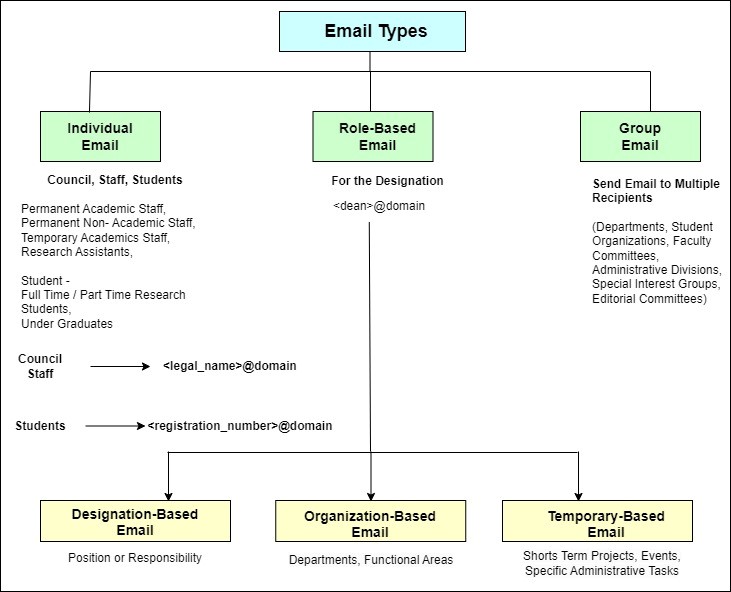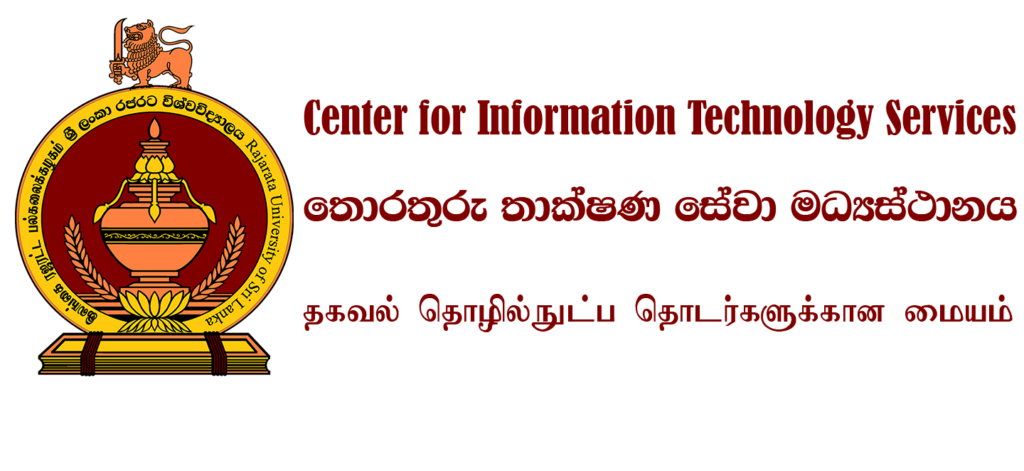Introduction
The University Electronic Mail (Email) Usage Policy outlines the guidelines and regulations governing the appropriate and responsible use of email services provided by the university. Email communication plays a critical role in facilitating academic and administrative functions, and it is essential to establish a clear policy to ensure the security, efficiency, and professionalism of university’s email system. This policy sets forth the principles that all members of the university community must adhere to when using their university-issued email accounts to foster effective communication and protect the university’s digital environment. University provides Google corporate accounts as the official email accounts of the Rajarata University of Sri Lanka.
Purpose
- The primary purpose of the University Email Usage Policy is to provide a framework for the proper use of university email accounts by the university community. The policy aims to:
- Safeguard Information Security: Implement measures to protect sensitive university-related information from unauthorized access, data breaches, and other security risks.
- Ensure Efficient Communication: Encourage the effective and timely exchange of academic, administrative, and official communications among members of the university community.
- Promote Professionalism: Set expectations for respectful and courteous email communication to maintain a positive and productive environment within the university.
- Comply with Legal and Regulatory Requirements: Align email practices with applicable laws, regulations, and data protection standards to avoid legal liabilities and safeguard the university’s reputation.
- Educate on Digital Etiquette: Promote email etiquette and best practices to enhance the clarity and professionalism of email communication.
Types of the Email

Individual-based email

Individual email addresses are available to university council members, staff, and students.
Permanent academic staff, permanent non-academic staff, temporary academic staff, and research assistants are considered staff members and undergraduate, full-time, and part-time research students are considered students.
The local part of individual-based emails created for University Council members and staff is based on his/her legal name. Example <legal_name>@<domain>
When an assigned staff member is transferred to another division within the Rajarata University of Sri Lanka, a new email account will be created.
The former email account will be deactivated and redirected to the new email.
The local part of the individual-based emails created for the students is based on the registration number. Example: <registration_number>@<domain>
Each council member, staff member, and student can have only one institutional email. However, staff members can have more than one role-based email.
Role-based email

Role-based email addresses are email accounts that are associated with specific job functions, departments, or services rather than being tied to individual person. These email addresses are created to serve special purposes within the university’s administrative structure and facilitate efficient communication and organization. Role-based email addresses play a crucial role in enhancing the university’s communication channels and ensuring that important messages reach the appropriate departments or personnel. Examples: dean@mgt.rjt.ac.lk, ar@med.rjt.ac.lk, exam@ssh.rjt.ac.lk. All role-based email accounts should be handed over to the next person who comes into that role/position after the password reset. Such accounts should be used for official purposes and not for private messages. Users should not remove official messages as these role-based email accounts are used exclusively for archiving purposes. Also, role-based emails can be further classified into three categories
- Designation-based
- Organization-based
- Temporary-based
Group Emails

Group email addresses (also known as email distribution lists or mailing lists) are email accounts that are associated with a specific group or category of individuals.
These email addresses are created to simplify the process of sending emails to multiple recipients who share a common interest, affiliation, or role within the university.
Group email addresses allow for efficient communication and dissemination of information to a targeted audience without having to individually select each recipient.
Group email addresses can be organized based on various criteria, such as: academic departments, student organizations, faculty committees, administrative teams, special interest groups, and editorial committees.
Scope
This policy applies to the University community which includes the following personnel.
- University council members
- University administrative officers
- Permanent academic staff
- Permanent non-academic staff
- Temporary academic staff
- Undergraduate students
- Research assistants
- Full time and part time research students
List of SOPs
.


